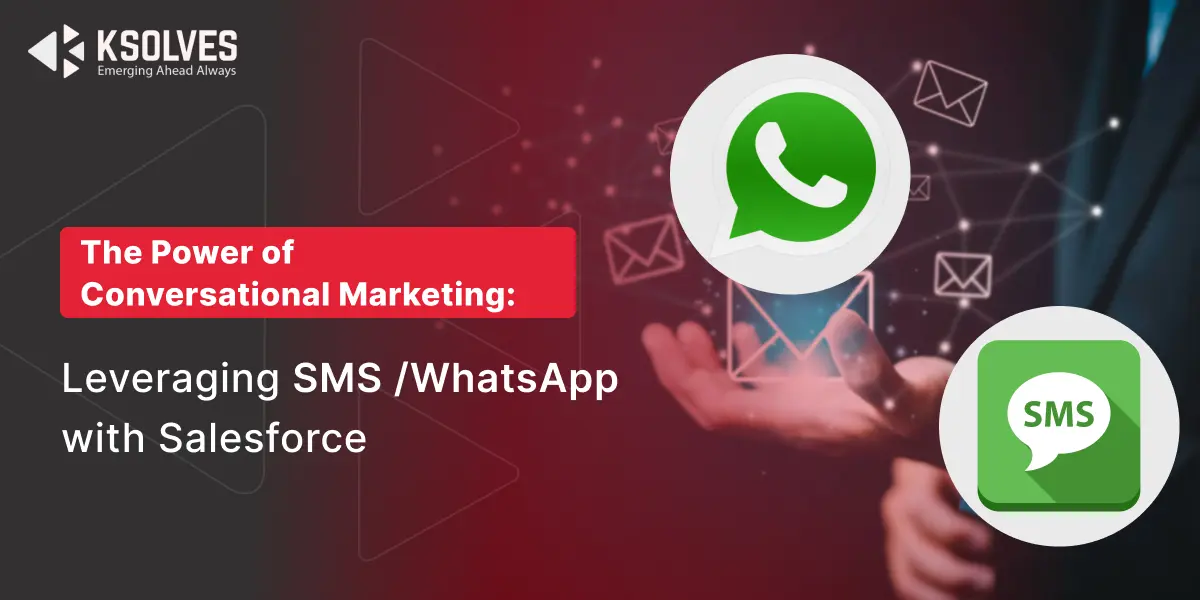In today’s fast-paced digital world, businesses are always looking for better ways to communicate with their customers. And one of the powerful methods currently used by businesses is called conversational marketing. This marketing is all about having real-time chats with people, making them feel special and understood.
However, when it comes to messaging, there are two very popular communication channels that come into the limelight: SMS (text messages) and WhatsApp. They are quick and easy to use, which makes them a first choice for everyone. By leveraging these messaging channels like SMS and WhatsApp, businesses can establish direct lines of communication with their audience and ensure seamless conversations at every stage of the customer journey.
By integrating them with Salesforce, the world’s leading customer relationship management (CRM) platform, businesses can boost their conversational marketing efforts to drive engagement, conversions, and customer satisfaction.
What is Conversational Marketing?
Conversational marketing is rooted in the principle of building relationships through dialogue. Unlike traditional marketing methods, which are characterized by one-way communication, conversational marketing emphasizes active engagement and personalized interactions. In short, it’s all about communicating with website visitors in real-time. This approach boosts business communication, especially when paired with smart conversational strategies.
Conversational marketing can bring various benefits for your business, but for this, you need to choose the right Salesforce messaging app that enables you to manage your conversational marketing effectively. By choosing the right Salesforce messaging app, you can reap the best outcomes from your conversational marketing strategies and improve your business communication.
The Power of SMS and WhatsApp
SMS and WhatsApp have revolutionized communication by boasting billions of users across the world. These platforms offer unparalleled reach and engagement so that brands can connect with customers on devices they use daily. Whether it’s sending promotional offers, delivering order updates, or providing customer support, Salesforce SMS marketing and WhatsApp messaging provide a direct and intimate channel for communication. Moreover, with features like multimedia messaging, businesses can enhance the user experience by sharing images, videos, and documents effortlessly.
Integrating SMS and WhatsApp with Salesforce for Conversational Marketing
Salesforce serves as the backbone of modern customer engagement and empowers businesses to manage interactions across multiple touchpoints. By integrating SMS and WhatsApp for Salesforce conversational marketing, organizations can unlock a host of benefits, including:
Enhanced Customer Engagement: By integrating SMS and WhatsApp within Salesforce, organizations can easily connect with customers in real-time on their preferred messaging platforms. This leads to higher engagement levels as customers appreciate the convenience and immediacy of communication.
Improved Lead Conversion: With the ability to initiate conversations and provide instant assistance through SMS and WhatsApp, organizations can nurture leads more effectively. This approach increases the chances of converting your prospects into paying customers.
Personalized Customer Experiences: By leveraging data within Salesforce, organizations can personalize messages based on customer preferences, past interactions, and purchase history. This tailored approach creates meaningful experiences that resonate with customers, fostering loyalty and retention.
Data-driven Insights: Every interaction on SMS and WhatsApp generates valuable data that can be analyzed to gain insights into customer behavior and preferences. By integrating these platforms with Salesforce, organizations can access real-time analytics, track campaign performance, and make data-driven decisions to optimize their marketing strategies.
Increased Sales Effectiveness: By integrating SMS and WhatsApp directly into Salesforce, sales teams can seamlessly communicate with prospects and customers, providing timely updates, addressing inquiries, and closing deals more efficiently. This improves sales productivity and accelerates revenue generation.
Scalability and Flexibility: As organizations grow, the integration of SMS and WhatsApp into Salesforce scales effortlessly to accommodate increased communication volumes and evolving customer needs. This flexibility allows businesses to adapt and innovate their conversational marketing strategies over time.
Enhanced Reporting and Analytics: By consolidating messaging data within Salesforce, organizations gain access to robust reporting and analytics capabilities. From tracking campaign performance to measuring customer sentiment, these insights drive informed decision-making and optimize marketing strategies.
In summary, integrating SMS and WhatsApp into Salesforce for conversational marketing empowers organizations to deliver exceptional customer experiences, drive engagement, and achieve their marketing and sales goals effectively.
Real-World Use Cases
The integration of SMS and WhatsApp with Salesforce holds immense potential across various industries and use cases:
E-Commerce: Send order confirmations, shipping updates, and personalized product recommendations via SMS/WhatsApp, driving repeat purchases and fostering customer loyalty.
Retail: Notify customers about store promotions, upcoming sales events, or product launches in real-time, boosting foot traffic and sales conversions.
Healthcare: Facilitate appointment reminders, medication adherence programs, and virtual consultations through secure messaging channels, enhancing patient engagement and adherence.
Finance: Provide account alerts, fraud notifications, and personalized financial advice via SMS/WhatsApp, improving customer satisfaction and retention in the highly competitive financial services sector.
Best Practices for Conversational Marketing with Salesforce
To harness the full potential of conversational marketing with Salesforce integration, consider the following best practices:
Obtain Consent: Ensure compliance with data privacy regulations by obtaining explicit consent from customers before initiating messaging communications.
Segmentation and Targeting: Leverage Salesforce’s segmentation capabilities to tailor messaging content based on customer demographics, preferences, and behavior.
Personalization: Craft personalized messages that resonate with each recipient, leveraging Salesforce’s rich customer data to deliver relevant and contextual experiences.
Automation: Implement automated workflows to streamline repetitive tasks and deliver timely messages at key touchpoints throughout the customer journey.
Monitor and Optimize: Continuously monitor campaign performance and customer feedback, leveraging Salesforce analytics to refine messaging strategies and drive continuous improvement.
Wrapping Up
The integration of SMS and WhatsApp messaging platforms into Salesforce represents a significant opportunity for businesses to elevate their conversational marketing efforts. By leveraging these efficient communication channels within the leading CRM solution, businesses can enhance their customer experience and drive engagement to achieve their marketing and sales objectives.
Looking to streamline your Salesforce Conversational Marketing efforts by sending WhatsApp and SMS messages directly from your Salesforce platform? If yes, then check out Lead Manager Ninja, our top-rated Salesforce SMS app.
![]()

